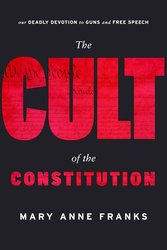Book description
Political speech in the United States is undergoing a crisis. Glendon's acclaimed book traces the evolution of the strident language of rights in America and shows how it has captured the nation's devotion to individualism and liberty, but omitted the American traditions of hospitality and care for the community.
Recommended on 3 episodes:
The Dobbs Decision Isn’t Just About Abortion. It’s About Power.
On Friday, a Supreme Court majority voted to overturn Roe v. Wade. On Sunday, we released an episode with Dahlia Lithwick that goes through the court’s decision in detail, and we will continue to come out with new episodes on the ruling — and its vast implications — in the days and weeks to come.
Today, we’re re-airing an episode that we originally released in February of this year with Columbia Law professor Jamal Greene — a conversation that is even more relevant now than it was when we originally released it. The Dobbs ruling may be the most poignant example of how extreme the U.S. Supreme Court has become in recent years, but it’s certainly not the only one.
“Getting race wrong early has led courts to get everything else wrong since,” writes Greene in his book “How Rights Went Wrong.” But he probably doesn’t mean what you think he means.
“How Rights Went Wrong” is filled with examples of just how bizarre American Supreme Court outcomes have become. An information processing company claims the right to sell its patients’ data to drug companies — it wins. A group of San Antonio parents whose children attend a school with no air-conditioning, uncertified teachers and a falling apart school building sue for the right to an equal education — they lose. A man from Long Island claims the right to use his homemade nunchucks to teach the “Shafan Ha Lavan” karate style, which he made up, to his children — he wins.
Greene’s argument is that in America, for specific reasons rooted in our ugly past, the way we think about rights has gone terribly awry. We don’t do constitutional law the way other countries do it. Rather, we recognize too few rights, and we protect them too strongly. That’s created a race to get everything ruled as a right, because once it’s a right, it’s unassailable. And that’s made the stakes of our constitutional conflicts too high. “If only one side can win, it might as well be mine,” Greene writes. “Conflict over rights can encourage us to take aim at our political opponents instead of speaking to them. And we shoot to kill.”
It’s a grim diagnosis. But, for Greene, it’s a hopeful one, too. Because it doesn’t have to be this way. Supreme Court decisions don’t have to feel so existential. Rights like food and shelter and education need not be wholly ignored by the courts. Other countries do things differently, and so can we.
We also discuss the reason we have courts in the first place, why Greene thinks Germany’s approach to abortion rights could be a model for America, Greene’s case for appointing nearly 200 justices to the U.S. Supreme Court and much more.
Books recommended:
June 28, 2022
3 books
recommended
View
Sex, Abortion and Feminism, as Seen From the Right
For decades, the conservative position on abortion has been simple: Appoint justices who will overturn Roe V. Wade. That aspiration is now likely to become reality. The question of abortion rights will re-enter the realm of electoral politics in a way it hasn’t for 50 years. And that means Republicans will need to develop a new politics of abortion — a politics that may appeal not only to their anti-abortion base but to some of the many Americans who believe Roe should stand.
One place those Republicans may look for inspiration is to the work of the legal scholar Erika Bachiochi. She is a fellow at the Ethics and Public Policy Center, director of the Wollstonecraft Project at the Abigail Adams Institute and the author of “The Rights of Women: Reclaiming a Lost Vision,” where she argues for a “dignitarian feminism.” Bachiochi embraces women’s gains in professional and civic life but holds that techno-pharmacological birth control, the sexual revolution and the legalization of abortion have created a sexual and family culture that has ultimately been devastating to women’s well-being.
In hopes of improving that status quo, Bachiochi puts forward a policy agenda that could very well become the post-Roe playbook for some Republicans: tighter abortion restrictions combined with a robust slate of family policies — some of which would be even bolder than the Biden administration’s proposals to date. Hers is not an argument I agree with, but it’s one that I imagine will become increasingly salient in a post-Roe America.
In the third episode of our series “The Rising Right,” we discuss Bachiochi’s views on why the “gender revolution” has stalled; her belief that market logic has come to dominate our understandings of family, parenting, sex and feminism; her critique of modern “hookup” culture; and her pro-family economic agenda. And we debate whether it’s realistic to encourage the use of natural fertility regulation over hormonal contraception, how abortion relates to single motherhood and poverty, whether stricter abortion laws might benefit or hurt poor women, what role the law should play in teaching moral behavior, whether progressives have become too “Lockean” in their understanding of bodily autonomy, whether the sexual revolution gave people too much choice and more.
Books recommended:
Let’s Talk About How Truly Bizarre Our Supreme Court Is
“Getting race wrong early has led courts to get everything else wrong since,” writes Jamal Greene. But he probably doesn’t mean what you think he means.
Greene is a professor at Columbia Law School, and his book “How Rights Went Wrong” is filled with examples of just how bizarre American Supreme Court outcomes have become. An information processing company claims the right to sell its patients’ data to drug companies — it wins. A group of San Antonio parents whose children attend a school with no air-conditioning, uncertified teachers and a falling apart school building sue for the right to an equal education — they lose. A man from Long Island claims the right to use his homemade nunchucks to teach the “Shafan Ha Lavan” karate style, which he made up, to his children — he wins.
Greene’s argument is that in America, for specific reasons rooted in our ugly past, the way we think about rights has gone terribly awry. We don’t do constitutional law the way other countries do it. Rather, we recognize too few rights, and we protect them too strongly. That’s created a race to get everything ruled as a right, because once it’s a right, it’s unassailable. And that’s made the stakes of our constitutional conflicts too high. “If only one side can win, it might as well be mine,” Greene writes. “Conflict over rights can encourage us to take aim at our political opponents instead of speaking to them. And we shoot to kill.”
It’s a grim diagnosis. But, for Greene, it’s a hopeful one, too. Because it doesn’t have to be this way. Supreme Court decisions don’t have to feel so existential. Rights like food and shelter and education need not be wholly ignored by the courts. Other countries do things differently, and so can we.
This is a crucial moment for the court. Stephen Breyer is retiring. And in this term alone, the 6-3 conservative court is expected to hand down crucial decisions on some of the most divisive issues in American life: abortion, affirmative action, guns. So this is, in part, a conversation about the court we have and the decisions it is likely to make. But it’s also about what a radically different court system could look like.
We discuss the Supreme Court’s recent decisions on vaccine mandates, why Greene thinks judicial decision-making is closer to punditry than constitutional interpretation, the stark differences in how the German and American Supreme Courts handled the issue of abortion, Greene’s case for appointing nearly 200 justices to the U.S. Supreme Court, why we even have courts in the first place and much more.
Books recommended:












